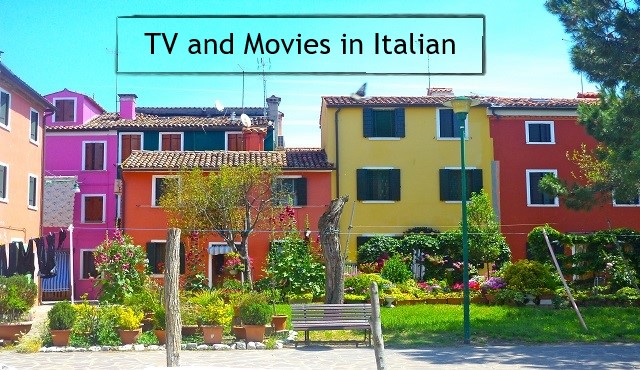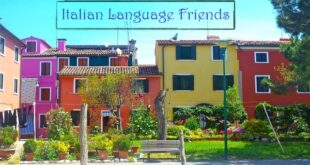How do I say, “TV show” and “movies” in Italian?
The programs we watch on a television set (il televisore) or on a screen (lo schermo) are referred to most commonly in both English and Italian as “TV.” The pronunciation, of course, is different in each language. In Italian, the abbreviation “TV” is pronounced as an Italian would pronounce the letters “t” and “v,” which sounds like “tee-vooh.” Notice from the table below that there is an Italian word for TV programs in general (la televisione), and therefore the Italian abbreviation TV is feminine as well, and takes the feminine definite article la, as in la TV.
| TV | La TV / La televisione |
| Cable TV | La TV via cavo |
| Satellite TV | La TV sattelitare |
| RAI-TV | Italian state television (Radio-Televisione Italiana) |
| Television set | Il televisore |
| TV or computer screen | Lo schermo |
| TV show | Un programma Un programma televisivo |
| TV series | Una serie TV Un telefilm |
| Episode | Una puntata |
| Situation Comedy | Una serie TV sitcom Una commedia |
| Comedy show | Un programma comico |
Back in the day, Italians used to refer to a movie as “una pellicola,” but that word is no longer in common usage. Nowadays, Italians most often refer to a movie with the American word “film.” For instance, “Valeva la pena il film?” means, “Was the film worth it?”
Movies in general are either “i film,” with the borrowed English word preceded by the plural masculine definite article “i” in Italian, or “il cinema,” which is a collective masculine noun.
The usual Italian verbs for to watch (guardare) and to see (vedere) describe the act of watching a screen to see a TV show or movie.
| Movie theater | Il cinema |
| Film studio | Lo studio cinematografico |
| Movie | Il film (La pellicola) |
| Movies | I film / Il cinema |
| to capture an image for a film | filmare / riprendere / girare |
| to be recorded | essere filmato |
| to watch a movie | guardare un film |
| to watch a movie | vedere un film |
Using piacere to say we like a TV show or movie
In Italian, a few simple sentences will suffice to say if we liked what we saw — or not. You may recall that Italians use the irregular verb piacere to convey the idea that they like something. For a refresher on how this verb works, please refer to the past blog, How to Use “Piacere” to Say, “I like it!”
The most important thing to remember is that the conjugation of piacere
will have to agree with the number of things that are being liked.
So, when speaking in the present tense, if one thing is liked, simply use the third person singular conjugation piace.
If many things are liked in the present, use the plural third person, which is piacciono.
For the past tense, we can use the passato prossimo third person singular forms è piacuto and è piaciuta for the one-time event when we liked something.
If many things are liked, the third person plural forms sono piaciuti for the masculine plural and sono piaciute for the feminine plural are used.
Then put the indirect object pronoun mi before the verb to make the simple sentence: “To me this is pleasing!” Or, as we would say in English, “I like/liked this!”
To ask a friend if they like or liked something, put ti before the verb, for: “Is/was this pleasing to you?” Or, as we would say in English, “Do/Did you like this?”
If, for some reason, you do NOT like what you have watched, just start your Italian sentence with the word non.
What we might say about our favorite TV show or movie that we like:
| Mi piace questo film. | I like this movie. |
| Mi è piaciuto questo film. | I liked this movie. |
| Mi piace molto questo film. | I really like this movie. |
| Mi è piaciuto molto questo film. | I really liked this movie. |
| Ti piace questo film? | Do you like this movie? |
| Ti è piaciuto questo film? | Did you like this movie? |
What we might say about our favorite TV show or movie that we did NOT like:
| Non mi piace questo film. | I don’t like this movie. |
| Non mi è piaciuto questo film. | I didn’t like this movie. |
| Mi piace molto questo film. | I really don’t like this movie. |
| Mi è piaciuto molto questo film. | I really didn’t like this movie. |
| Ti piace questo film? | Don’t you like this movie? |
| Ti è piaciuto questo film? | Didn’t you like this movie? |
Using common expressions to say we like a TV show or movie
Of course, there are many common expressions that go beyond the simple, “I like it,” or “I don’t like it.” In English, for instance, we might say, “It was cool,” or “It was out of this world.” It seems like new English expressions are invented almost every day for how we feel about things! So, it should come as no surprise that Italians have also created expressions for feelings that go deeper than simply liking. Let’s discuss a few that you may hear when carrying on a conversation with your Italian friends.
To get a conversation started, you can use the phrases, “Vale la pena?” for “Is it worth it?” “Valeva la pena il film?” means, “Was the film worth it?” as mentioned earlier.
In the table below are some answers that you might hear from a native Italian who has enjoyed a film. Try them out and surprise your Italian friends!
| Mi piace un sacco! | I like it a lot! (lit. a sack full) |
| Mi è piaciuto un sacco! | I liked it a lot! |
| È stato bello! | It was great! |
| È / È stato meraviglioso! | It is / was wonderful! |
| È / È stato stupendo! | It is / was amazing / cool! |
| È / È stato fantastico! | It is / was fantastic / cool! |
| È / È stato fico / figo! | It is / was cool! |
| È / È stato fichissimo / fighissimo! | It is / was the coolest! |
| È / È stato da paura! | It is / was cool! |
| È / È stato il meglio! | It is / was the best! |
| È il migliore film che io abbia mai visto. | It is the best film that I have ever seen. |
Some common movie genres and expressions to say what we prefer
| Action | Film d’azione |
| Adventure story | Storia d’avventura |
| Costume drama (historical TV show with costumes) | Sceneggiato in costume |
| Costume drama (historical film with costumes) | Film in costume |
| Comedy | Film comico / commedia |
| Comedy drama | Commedia drammatica |
| Dark comedy | Commedia nera |
| High comedy | Commedia sofisticata / da intenditori |
| Low comedy (bawdy) | Commedia popolare |
| Slapstick comedy | Farsa / Pagliacciata* |
| Musical comedy | Commedia musicale |
| Romantic comedy | Commedia romantica |
| Documentary | Un documentario |
| Drama | Storia drammatica |
| Drama movie | Film drammatico / Dramma |
| Detective movie | Un poliziesco / Un giallo** |
| Film noir (thriller genre) | Film noir |
| Foreign Film | Film straniero |
| Horror | Film horror / Film dell’orrore |
| Mystery | Un giallo** |
| Science Fiction / Sci-fi | Film di fantascienza |
| Psychological thriller | Thriller psicologico |
| Thriller (suspense film) | Thriller / Giallo |
| Western | Film Western |
*Reference to the opera Pagliacci, whose main character is a clown that performs slapstick humor with puppets.
**Mystery books and films are referred to by the color giallo, which is derived from the yellow cover all mystery books were given in the past.
The verb preferire means “to prefer,” which is a regular -isc conjugated -ire verb. “I prefer…” is “Io preferisco…” To ask a question of someone else, say, “Tu preferisci…?”
If you want to say you prefer one movie genre over another, just use the adjective preferito. This also works for your favorite movie, TV show, color, etc. Just make sure to change the ending of preferito (a,i,e) to reflect what it is you are describing, whether masculine or feminine, singular or plural.
Here are examples from the dialogue below:
È il tipo di film che io preferisco.
It’s the type of film that I prefer.
Non per me. Il mio film preferito è un buon giallo.
Not for me. My favorite movie is a good mystery movie.
If you want to say, “I liked (film) better than…” use the sentence construction:
“Mi piace… (film) più di + definite article… (film).
Ma mi piace La Vita è Bella più del Commissario Montalbano.
I like La Vita è Bella more than Detective Montalbano.
Another way to make a comparison between films is to say:
“This film is much better than…”“Questo film è molto meglio di + definite article…”
Questo film è molto meglio del Commissario Montalbano, sono sicuro!
This film is much better than Detective Montalbano, I am sure.
Finally, to mention who has written or directed a movie, use the conjunction “di” to mean “by.”
Below is a simple dialogue between two friends, Maria and Anna, talking about their favorite movie and TV show. There are, of course, many variations. Think about your favorite movie and create phrases describe your own feelings in Italian!
| Maria: | Ieri sera, ho guardato il film, La Vita è Bella, di Roberto Benigni. |
| Last night, I watched the movie, “Life is Beautiful,” by Roberto Benigni. | |
| Anna: | Ne è valsa la pena? |
| Was it worth it? | |
| Maria: | Si, vale la pena. Mi è piaciuto molto questo film! |
| Yes, it is worth it. I really liked this film! |
|
| Anna: | È una storia drammatica? |
| Is it a drama? | |
| Maria: | Si, è una storia drammatica, ma la prima parte è anche un po’ comica. |
| Yes, it is a drama, but the first part is also a bit funny. | |
| Anna: | Ah, una commedia drammatica. |
| I see, a comedy drama. | |
| Maria: | È il tipo di film che io preferisco. |
| It’s the type of film that I prefer. | |
| Anna: | Non per me. Il mio film preferito è un buon giallo. |
| Not for me. My favorite movie is a good mystery movie. |
|
| Commissario Montalbano è figo. | |
| Detective Montalbano is cool. | |
| Maria: | Boh. Ho visto molte puntate del Commissario Montalbano sul TV. |
| Well. I have seen many episodes of Detective Montalbano on TV. | |
| Ma mi piace La Vita è Bella più del Commissario Montalbano. | |
| I like La Vita è Bella more than Detective Montalbano. | |
| Questo film è molto meglio del Commissario Montalbano, sono sicuro! | |
| This film is much better than Detective Montalbano, I am sure. | |
| Anna: | Allora, devo guardare La Vita è Bella un giorno. |
| Well, then, I will have to watch La Vita è Bella one day. |
Remember how to talk about TV and the Movies in Italian and I guarantee
you will use these phrases every day!
 Fra Noi Embrace Your Inner Italian
Fra Noi Embrace Your Inner Italian







One comment
Pingback: Comparisons using “di” – Fra Noi